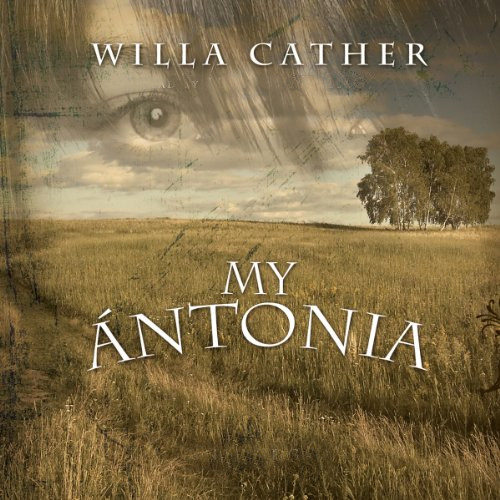My Ántonia
by Willa Cather

My Ántonia, by Willa Cather. Originally published in 1918.
Reviewed by Ed Lengel
Willa Cather (1873-1947), considered one of the foremost American novelists, is remembered today for her stories about western life, particularly on the Great Plains. Her masterpieces include O Pioneers! (1913); The Song of the Lark (1915); and the underappreciated Death Comes for the Archbishop (1927), which takes place in New Mexico. The author’s best-known work, My Ántonia, published in 1918, is probably the most frequently assigned of her works in high school and/or college literature courses–and with good reason. It is considered her masterpiece.
Set at an indeterminate time in the late nineteenth century, the novel originally begins (in a section later edited out) with Cather meeting a successful but depressed lawyer named Jim Burden during a train journey. Opening up, Jim tells Cather about his childhood in pioneer Nebraska, transitioning into the primary narration, told episodically in five parts. Like Cather, Jim emigrated—as a child– from Virginia– with his family, and moved to the Great Plains, to the fictionalized settlement of Black Hawk, Nebraska. His parents worked hard, and their prosperity superseded their acquaintances—from the very start.
The Burdens’ neighbors, the Shimerdas, are a study in contrasts. Unhappy exiles from their native Bohemia (now the Czech Republic), they live in the most primitive circumstances imaginable, spending their first winter on the plains in what amounts to a large hole in the ground surrounded by uncultivated fields. Their eldest daughter, Ántonia, becomes close friends with ten-year-old Jim despite the fact that she is in her teens. Jim and Ántonia explore their surroundings together, getting to understand the cycles of the earth and the challenges of living on the frontier. Passages describing their experiences express an understated perspective that is nevertheless lyrically beautiful.
Ántonia is doomed to face far more difficulties than Jim. Unable to endure homesickness and the challenges of caring for his family on the frontier, Antonia’s father ends his own life without having the consolations of the Catholic religion that means so much to him; no priests are available. After his passing, Ántonia must step forward to carry the family’s burdens with a stoicism that Jim admires and will never forget. She is in her element. After a few years, however, Jim’s family moves closer to town; with good intentions he invites Ántonia to relocate there, and work as a neighbor’s housekeeper. Although she succeeds in her work, a predatory neighbor also nearly murders her. Later, Ántonia is victimized by a man who abandons her with a child born out of wedlock. In the end, though, Ántonia returns to her element, marrying a fellow immigrant, moving back to a Nebraska farm, and having ten children whom Jim meets many years later after he has gone away and entered into an elite marriage that turns sour.
Jim and Ántonia’s respective destinies reflect their immutable inner natures, reflecting widely accepted early twentieth-century theories about national and ethnic origins. Cather, who grew up to leave the Great Plains and move to New York City, where she spent the rest of her life, clearly identified with the unhappy character of Jim, who was never able to set down roots in a frontier world where he never truly belonged. With her earthiness, fertility, and elemental being, Ántonia represents a kind of archaic Earth Mother/Goddess who belongs to the everlasting land.
More deeply, writing at a time when the character of the United States seemed endangered by the twin menaces of immigration and world war, Cather sought to arrive at a hopeful understanding of the emerging personality of a still-new nation. Where others saw the millions arriving from Europe and other parts of the world as a threat, Cather hinted that by importing their ancient European peasant traditions to become guardians of the American land, they breathed life into it as they established themselves. In the process, they superseded the old America of Virginia and the other original thirteen colonies to create a new, powerful, even eternal identity.
Ed Lengel is an author, a speaker, and a storyteller.




